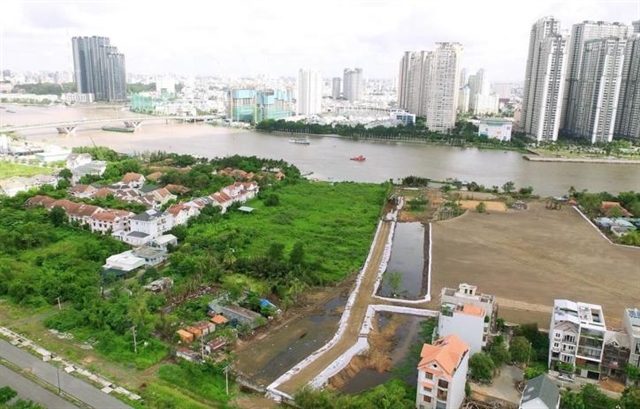 Economy
Economy


|
| A corner of Thủ Thiêm new urban area. — VNA/VNS Photo Quang |
Compiled by Mai Hương
On January 10, Tân Hoàng Minh Group’s chairman Đỗ Anh Dũng sent a letter to Party General Secretary Nguyễn Phú Trọng and other top leaders revealing its intention to pull-out of the purchase of a 10,060sq.m land lot in Thủ Thiêm new urban area which its member company Viet Star Real Estate Investment Co Ltd won the bid at a record price of VNĐ 24.5 trillion (US$1.07 billion) last month.
Dũng explained the decision was made to help safeguard the stability of the country’s real estate industry, admitting “such a high bid price could lead to negative consequences for the real estate market”.
The group is also ready to accept all penalties, including surrendering its deposit of more than VNĐ588 billion ($26 million) for its unilateral contract cancellation.
Although many market insiders have said this move is not too surprising and could be predicted in advance, the action of “dropping the stake” still has caused a big market turmoil.
Push the price and then put down the stake
Why is a company ready to lose a big deposit of hundreds of billions of Vietnamese đồng after it won a bid?
The winning price hit a peak of VNĐ2.43 billion per m2 in Thủ Thiêm, 8.3 times higher than the reserve price and the highest ever paid for a square metre of land anywhere in the country.
According to most analysts, such a high price, which is even more than twice the land price in Đồng Khởi street in the centre of HCM City, makes no sense and ahead of the development of this city by a decade.
After the Tân Hoàng Minh Group’s historic bidding price, land prices in this area and the surrounding land lots skyrocketed.
According to Lao Động (Labour) newspaper, apartment prices located near the river on Thủ Thiêm peninsula recorded the highest level of about VNĐ210 million per m2. A survey by a real estate company specialising in Thủ Đức City showed land prices at riverside locations around this peninsula range between VNĐ350-400 million per m2. The price has been even inflated by 40 per cent in some areas in a short time.
Some experts believe this auction has created a land fever in this area and other locations, benefiting some investors when the land price soared.
Previously, in a report submitted to the Prime Minister, the HCM City Real Estate Association (HoREA) also raised concerns about the adverse effects of land auctions in Thủ Thiêm.
HoREA chairman Lê Hoàng Châu mentioned the land fever in Thủ Thiêm had caused the market to “stand still” as some investors had stopped sales and hoarding goods, awaiting opportunities to increase prices.
However, he also warned if the land price was too high, going beyond the "law of value, competition, supply and demand", it would become a "double-edged sword" that would both damage consumers and could be detrimental to investors themselves because if the house price was too high and found no buyers, it could increase the amount of inventory.
Market turbulences
The fact that a business auctions too high and then puts down the stake, regardless of the motive, is a bad phenomenon, affecting the healthy development of the market.
Last week, the benchmark VN-Index lost the 1,500-point landmark as many realty stocks were locked in the floor for many sessions following the ‘unstaking scandal’ of Tân Hoàng Minh Group, especially property firms owning a large amount of lands in Thủ Thiêm.
The soaring price of land in Thủ Thiêm is also seen as potentially putting great pressure on the investments here when the business efficiency problem becomes more challenging because the land cost is too high.
Huỳnh Phước Nghĩa, a senior consultant at GIBC, said the unstaking decision of Tân Hoàng Minh Group poses a challenge for HCM City’s authority to organise a public and transparent auction and appraise land price.
Shared with vnexpress.net, Nghĩa said the difficulty for the city was that if the winning price was too high, the appraisal might be doubted that it did not keep up with the market price, while on the contrary, in case the winning price was not high, the city would face pressure to cause loss of land resources.
In addition, a new price level might be set after the Thủ Thiêm land auction and this might reduce the attractiveness of this peninsula in the eyes of investors if the bidding price was too high.
Loophole in bidding law
According to Đặng Hùng Võ, former Deputy Minister of Natural Resources and Environment, the land auction in Thủ Thiêm has revealed loopholes in Việt Nam’s bidding law which creates opportunities for some organisations and individuals participating in the auction to raise prices unreasonably to create fever on the ground to profit from it.
He suggested the amendment towards the direction that bidders must have guaranteed financial capacity and responsibility.
Many opinions also suggest if the deposit is not 20 per cent but 50 per cent of the property value, it will not be easy for Tân Hoàng Minh Group to “run away”.
Speaking to Người Lao Động (Labourer) newspaper, economist Nguyễn Văn Thuận proposed to increase the deposit rate from 20 per cent to 40-50 per cent compared to the starting price. Thus, businesses participating in the auction will carefully consider their investment plans before bidding.
According to HoREA, the law should be changed in the direction that investors can only bid for a land lot when they have enough money on the account, or when the total assets are higher than the bid value, or when there is a payment guarantee from a bank.
Architect Ngô Viết Nam Sơn proposed to increase sanctions when an investor wins an auction but drops the stake and add a regulation that businesses that have dropped the stake several times should be limited from participating in the upcoming auctions. The sanction should be more severe if there is proof that such businesses plan the drop ahead and profiteer from it. — VNS




